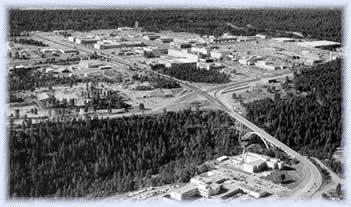Los Alamos National Laboratory (LANL)

The Los Alamos Laboratory, also known as SiteY or Project Y, was built in 1943 to design and build an atomic bomb. After World War II, LANL scientists continued to perfect US weapons during the cold war. Today, LANL is a security research institution, with the responsibility of ensuring the safety, security, and reliability of the nation’s nuclear deterrent.
Fact sheets
Nuclear workers from the Los Alamos National Laboratory have been included in many NIOSH studies. Below are fact sheets that summarize some of the study findings for workers.
Multi-site leukemia worker notification (March 2008) presented at worker briefing September 2008.
Publications from NIOSH studies done at LANL
Assessment of plutonium exposures for an epidemiological study of US nuclear workers. (2005)
Leukemia mortality among radiation-exposed workers. (2001)
Study of mortality among female nuclear weapons workers. (2000)
The health effects of downsizing in the nuclear industry: findings at the Los Alamos National Laboratory. (2000) Final Report; 152 pg.
A case control study of multiple myeloma at four nuclear facilities (2000) PDF version of report: pages 1-50 (6566KB); pages 51-100 (3416KB); pages 101-150 (5744KB); pages 151-202 (4283KB).
Publications from grant-funded studies done at LANL
Wiggs LD, Cox-DeVore CA, Voelz GL (1991). Mortality among a cohort of workers monitored for 210Po Exposure: 1944-1972. Health Phy 61(1):71-76.
Wiggs LD, Cox-DeVore CA, Wilkinson GS, Reyes M (1991). Mortality among workers exposed to external ionizing radiation at a nuclear facility in Ohio. J Occup Med 33(5): 632-637.
Wiggs LD, Johnson ER, Cox-DeVore CA, Voelz GL (1991). Mortality through 1990 among white male workers at Los Alamos National Laboratory: Considering exposures to plutonium and external ionizing radiation. Health Phy 67(6): 577-588.
Related websites
Los Alamos National Laboratory
Medical screening programs available to workers
Building Trades National Medical Screening Program
To learn more, call 1-800-866-9663
Worker Health Protection Program (WHPP)
To learn more, call 513-367-1333
